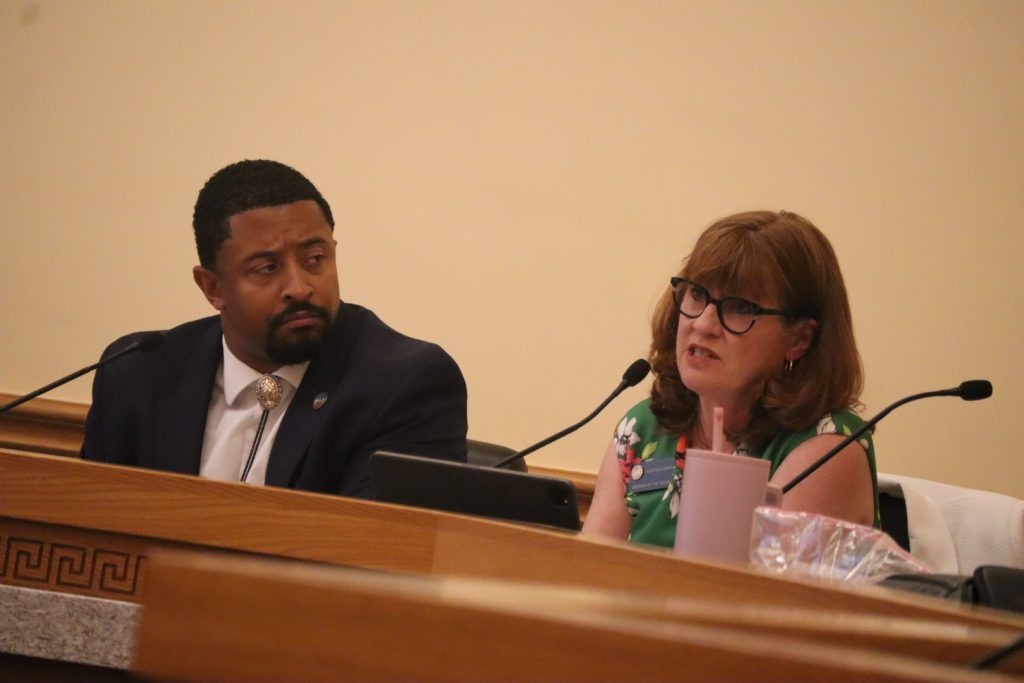Colorado lawmakers must ‘start over’ on health care policy, House speaker says, as federal changes send insurance rates surging
Western Slope communities could face the steepest rate hikes of all, as McCluskie, who represents mountain towns, calls for ways to mitigate the fallout

Robert Tann/Summit Daily News
Colorado House Speaker Julie McCluskie said state lawmakers will need to “start over” on health care policy to address the seismic market changes spurred by congressional Republicans’ sweeping tax and spending cut law.
Economic forecasters and state department heads on Wednesday painted a bleak picture of the tax law’s impacts on Colorado in a meeting with legislative leaders.
Along with creating a $1 billion deficit in the state’s current budget as a result of tax cuts, the law is already putting pressure on lawmakers to try and contain a surge in health insurance premiums that is expected to hit next year.
“Now is the moment for us to be as creative, imaginative — to think differently outside the box, to start over — with what we do with health care in this state,” said McCluskie, a Dillon Democrat.
She added that “this next session, we have got to address what is going on with health insurance and go back to the drawing board and figure out: ‘How do we make sure that people can find (and) access affordable health care.'”
Coloradans enrolled in health insurance through the state’s marketplace, Connect for Health Colorado, could see their premiums increase by an average of 28% in 2026, according to the preliminary premium rates requested by insurers.
On the Western Slope, the average premium increase could be 38% in 2026. Nearly 300,000 people enrolled in health insurance through Connect for Health Colorado at the start of this year.
A subsidy cliff
Officials say the spike is being driven by the tax law’s changes to Affordable Care Act marketplaces, like Connect for Health Colorado, where families and individuals can shop for and enroll in private health insurance plans and receive federal subsidies.
The law imposes new paperwork requirements, ends automatic re-enrollment, shortens enrollment periods and blocks lawfully present immigrants — such as asylum-seekers and refugees — from receiving subsidized plans. But the biggest change is what’s not in the bill.
The tax law did not include an extension of enhanced premium tax credits for marketplace plans that were passed under former President Joe Biden. They are set to lapse at the end of this year.
The tax credits boosted subsidies for those making below 400% of the federal poverty line, and, for the first time, expanded access to subsidized plans for those making over 400%.
In Colorado, 400% of the federal poverty line equals $62,600 a year for an individual and $128,600 for a family of four.

Colorado Division of Insurance Director Mike Conway said the subsidies have helped keep annual premium costs to 8.5% of a person’s income, which, for a family of four making $128,000, would be around $11,000.
“Anything over $11,000, they were subsidized for,” Conway said. “If their insurance coverage was $25,000, they got a premium tax credit of $14,000 in order to help them actually be able to get coverage for their family. It was a game changer.”
The subsidies were credited with driving record Affordable Care Act enrollment in Colorado and nationally.
Once those subsidies expire, an estimated 110,000 Coloradans could be at risk of losing access to health care coverage on the state marketplace, Conway said.
He also stressed that projected rate increases next year are an average. In areas like the Western Slope, where the average rate increase could be 38%, some premiums may jump as much as 60%, Conway said.
The overall net increase, however, could still be even greater for those making above the 400% poverty line — like a family of four making $128,000 — who will face both higher premiums and a complete loss of subsidies.
On the Western Slope, for example, Conway said the overall increase in annual premiums next year for that family could be $25,000.
Mountain resort areas continue to face the highest health insurance costs and lowest rates of enrollment in the state.
McCluskie said that while a household income of $128,000 for a family of four “sounds like a lot of money,” in her district, where some residents have had to pay even more in health insurance than they do on housing, “the math doesn’t work.”
Scrambling for solutions
Lawmakers expressed frustration that efforts to lower health care premiums, such as creating a reinsurance program in 2019 to help insurers cover high-cost claims, are now being undone by the federal changes.
“It feels like we are taking 100 steps backward when we had finally been able to see some progress,” McCluskie said.
The state’s reinsurance program is estimated to have saved over $2 billion collectively on premiums since it launched, but it is now slated to see a 40% funding cut next year as a result of the drop in federal subsidies, according to Conway.

Senate President James Coleman, a Denver Democrat, asked Conway what his plan is to “prioritize the reinsurance program and stabilize it as best as possible.”
Conway said he wants to continue conversations with the legislature to get more funding into the program through “whatever ways we can.” The program is partially funded through fees on premiums collected by insurers.
He added that other state-run affordability measures, such as the Health Insurance Buy-In program and OmniSalud, which helps undocumented immigrants afford and enroll in private health insurance, should also be prioritized.
Lawmakers have said they’ll be in a dire fiscal position, however, as the federal tax law’s spending cuts further complicate the state’s budget woes.
In the coming years, Colorado will see a reduction in Medicaid funding as the federal government limits matching funds and shifts more of the program’s costs to states.
New Medicaid work requirements and reauthorization periods, slated to go into effect in 2027, will also put further financial strain on state and county departments that administer the Medicaid program in Colorado.
When it comes to insurance premiums, McCluskie asked Conway if there’s still time for Congress to pass an extension of the subsidies before they expire at the end of this year.
Conway said Congress would need to approve legislation within a matter of weeks for insurers to be able to readjust for 2026, adding that the “window is closing very, very rapidly, and there hasn’t been any indication from leadership at the federal level” that they’re interested in extending the subsidies.
McCluskie said it was still worth pushing lawmakers in Congress to act.
“I’ll start calling today,” she said.

Support Local Journalism

Support Local Journalism
As a Summit Daily News reader, you make our work possible.
Summit Daily is embarking on a multiyear project to digitize its archives going back to 1989 and make them available to the public in partnership with the Colorado Historic Newspapers Collection. The full project is expected to cost about $165,000. All donations made in 2023 will go directly toward this project.
Every contribution, no matter the size, will make a difference.










